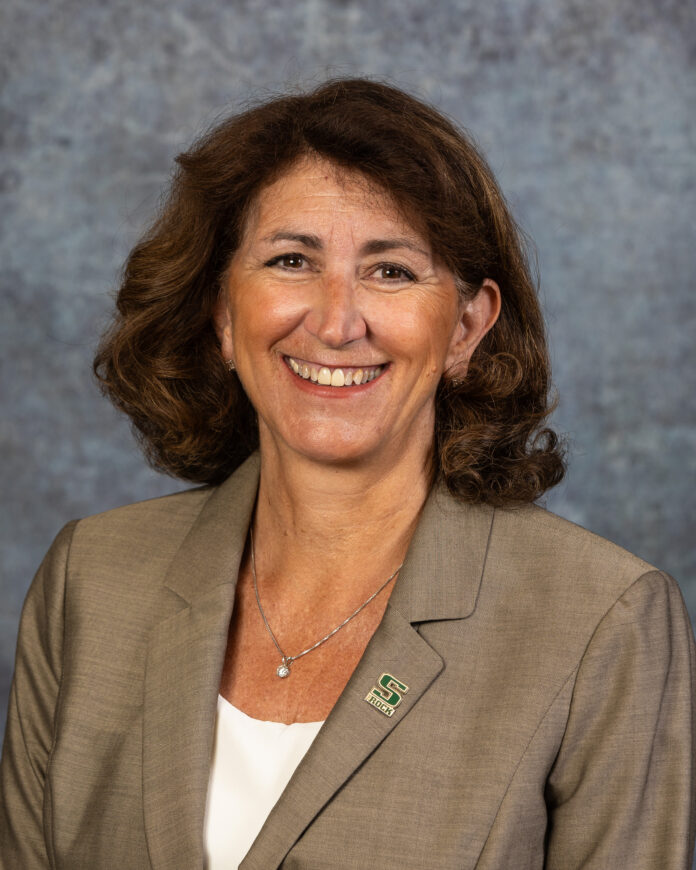SRU president Karen Riley and SRU Association of Pennsylvania State College and Universities Facilities (APSCUF) president Jason Hilton discussed policy and position changes during the university’s Spring Town Hall in Smith Student Center on Jan. 30.
Developments included a three-and-a-half-year agreement between APSCUF and Pennsylvania Association State System of Higher Education (PASSHE), new associate provost and chief human resources officer hires, relocation of campus police to the Student Union, new grants and financial statistics and acknowledgment of Gov. Josh Shapiro’s vision for higher education.
Policy and structural changes
Hilton prefaced Riley’s presentation by announcing that PASSHE and APSCUF reached an agreement in principle to continue university faculty contracts, with progress unabated, for three and a half more years. Hilton said there is not yet a contract resolution for PASSHE sports coaches.
Riley announced new positions such as Michael Zieg as provost and Holly McCoy as chief human resources officer. Ursula Payne was also appointed as associate provost. Upon clarification via email, Payne stated the title of her position is associate provost of academic management, though it may be tweaked.
The university will see additional changes in the newly formed Administrative Council, Temperature Committee and “work groups.”
According to the president, the Administrative Council will meet once a month and advise Riley alongside the cabinet.
“We have a great cabinet,” she said. “However, we need more voices at the table.”
Title IX Coordinator Karla Fonner heads the Temperature Committee alongside members such as University Police Chief Kevin Sharkey, aiming to understand issues bubbling up within certain groups, according to the president.
Riley said the newly formed work groups include representatives from the Council of Trustees, Foundation Board, Student Government Association and Alumni Board to help coordinate university efforts.
“This [collaboration] is pretty significant,” she said. “They don’t even know what each other do right now.”
In addition to administrative groups, Riley announced a new mentorship program for employees, faculty and staff. The program is in its conceptual stage.
Riley also stated that athletics no longer reports to student affairs and instead reports directly to the president, after suggestions from the athletic department.
Riley commented on Shapiro’s recently announced blueprint for higher education. The plan aims to reduce tuition costs and increase enrollment through collaboration between PASSHE, community colleges in Pennsylvania and state spending.
Riley stated that she met with the president of Butler County Community College and Shapiro on separate occasions regarding the matter. She said she is unable to comment further because the plan is “still at the conceptual level.”
The university will release information when directed by the governor, according to Riley.
After two years of planning, the president announced the new police station will not be built due to changes in cost. Originally tallying around $5 million, the estimates rose to at least $11.9 million. The university collected over $3 million for the project.
“The land we were going to build on includes a lot of mine mitigation we didn’t realize that we needed to do,” Riley said. “You should be unhappy with me if I’m going to spend $11.9 million on something right now.”
Due to the cancellation of the project, the president said the new police station will be housed in the Student Union after construction is finished.
New grants received include $100,000 and an irrevocable documented bequest for $2 million bolstering the Rock Teach scholarship, the largest grant for scholarships in university history, according to Riley.
Additional investments include a Strada grant, which allows students struggling financially to begin receiving money during unpaid internships and work-based learning opportunities.
“We do not want internships to be a position of privilege,” Riley said.
The president shared statistics including growing student retention rates of 2% this year and a 29% increase in cash flow. Riley said enrollment was up by double digits this year, relative to PASSHE’s overall 6% increase, a recovery since all-time losses during the COVID-19 pandemic.
Riley additionally announced a zero-based university budget starting next year. She said this year will see a 2% growth in total budget.








